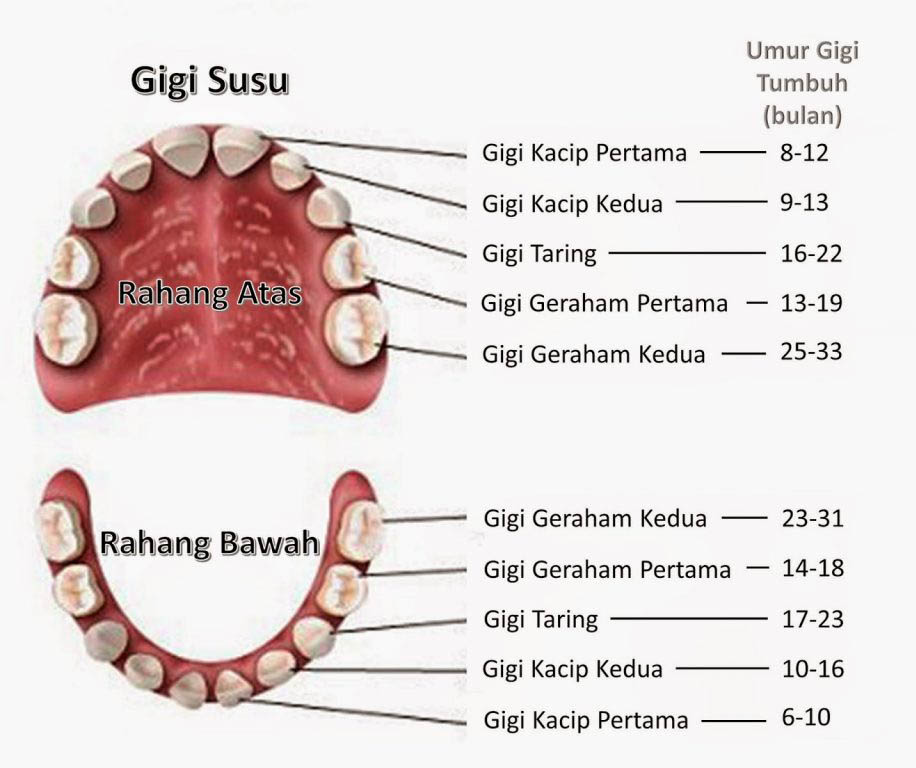
When will baby teeth erupt? This question is often asked by parents while caring for babies in the early stages of their development. In some cases, new baby teeth appear at varying ages and are different for each baby. There are babies whose teeth appear at an early age, but there are also babies whose teeth grow quite late.
However, baby teething basically takes place in almost the same period and is often preceded by the appearance of the two incisors on the lower front. Before knowing more about the stages of your baby's teeth growth, first identify the types of teeth that will grow in babies, as follows:
- Incisors, namely the front teeth on the upper and lower jaw. Usually the upper and lower incisors appear close together. These teeth are used to bite food.
- Canine teeth, namely teeth with sharp edges and are flanking the incisors on the upper and lower jaw. Canine teeth function to cut food.
- Premolars , these teeth function to crush food.
- Rear molars, these teeth also function to crush food and are larger in size than the front molars.
The growth of these types of teeth has a number of phases that are adjusted to the development of the baby's age, including:
- 6-10 months
The incisors appear first on the lower jaw then on the upper.
- 9-16 months
The second incisors on the lower and upper jaw begin to grow.
- 13-19 months
The first molars erupt, accompanied by increased saliva production.
- 17-23 months
The canine teeth are growing and it is a sign that the child is ready to eat solid food.
- 23-33 months
The second molars at the base of the upper and lower gums begin to grow.

It should be noted that the growth of teeth in infants varies greatly for each child. The function of baby teeth is also important, because it affects the growth and development of children. Therefore, keep fulfilling balanced nutritional nutrition so that they can stimulate the growth of their teeth properly. However, if the child has not shown signs of teeth growth at 1 year of age, immediately check your child to the dentist to get fast and proper treatment.
Cleaning children's teeth from an early age must be done properly and correctly. When the baby has not yet grown teeth, parents must clean the child's gums, this is because the remaining milk on the mucosa can stimulate the growth of pathogenic bacteria and fungi in the mouth. How to clean it can be with sterile wet gauze to rub the gum mucosa and tongue.
Then when the teeth have grown, there are certain types of bacteria such as Streptococcus Mutans that live on the surface of the hard tissue of the teeth. These bacteria are pathogenic bacteria that cause cavities. When the teeth start to grow, the child can be immediately introduced to the toothbrush. The toothbrush used varies depending on the condition of the child's teeth at that time.
The mouth is the port of entry for nutrients in the child's body. When a child's teeth have cavities, the chewing process is not perfect. This results in the efficiency of mastication and digestion is not optimal. In the golden period phase (age 0-5 years) children's growth and development is running fast, so optimal nutrient absorption is needed.
It should be emphasized that the notion "children's teeth will fall out for a while, why check them out" must be eliminated. Children's teeth are not only for chewing, but children's teeth are also a guide for adult teeth growth. Children with clean and healthy teeth tend to chew well, resulting in proper jaw growth, so there is no less room for adult teeth in the jaw. On the other hand, if a child's teeth are damaged or diseased and left untreated, the child is disturbed in the chewing process, so they tend to vomit. The habit of chewing on food results in the jaw development process not being optimal, the jaw tends to be small, the adult teeth lack space, eventually the adult teeth grow crowded.
When children are three years old and above, children tend to want to do everything alone, even want to brush their own teeth without the help of their parents. The child's ability to clean teeth is not optimal, because fine sensory movements are not well developed. In this case the role of parents is needed to help clean the teeth and mouth of children. "Playing toothbrush" with parents as a toothbrush model, is quite helpful for children to be able to clean their teeth with parents.
Dental and oral hygiene needs attention from an early age. The development of teeth and mouth is part of a child's growth and development, and affects the overall development of the child.
Article written by drg.Setia Budi.Sp.KGA (Children's Dental Health Specialist at EMC Sentul Hospital).
